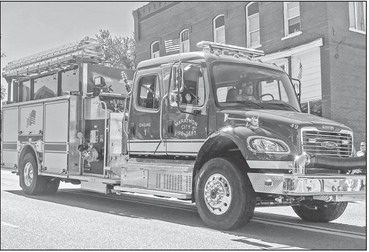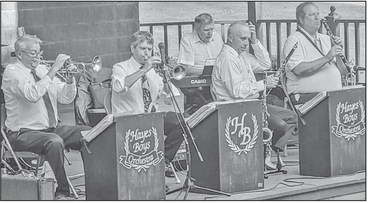Marathon OK’s fire budget with slight increases


Marathon City and its surrounding townships will pay slightly more for both fire protection and ambulance services next year under a 2026 budget approved by the village board last week Wednesday.
For fire protection, the village and the towns of Cassel, Rib Falls and Stettin will pay a total of $185,558 next year, an increase of roughly $6,200, or 3.5 percent, over this year. Village administrator Steve Cherek said the largest increase in the fire department’s operating budget is for wages, which was needed to account for an uptick in calls.
“It’s not that they got a wage increase,” he said. “It’s just that we’ve been getting a higher call volume.”
Cherek said the department’s information technology (IT) budget was also increased by $7,500 to pay for the replacement of two older computers, but otherwise, he said he tried to hold the line on most of the items in the budget.
“I do want to point out that, when the budget was first proposed for the fire department, it had a lot more increases,” he told trustees. “I worked with the fire department, looking for ways in our budget to reduce down based on past expense trends.”
An overall 12.5 increase in the operations budget was partially offset by a 16.2 percent decrease in the department’s principal and interest payments for its refinanced fire truck debt, which will save about $8,000 from this year to next.
Based on changes in equalized property values, which are used to determine the share each municipality pays for fire protection, Marathon City will see its payment go up by about $2,200 while Rib Falls will pay $2,400 less next year. Cassel’s portion will increase minimally ($144) and Stettin’s will see a $1,600 bump.
The EMS budget will increase by 2.2 percent, or $960 total, over this year, with the village and towns of Stettin, Cassel and Marathon being asked to pay a total of $43,800 in 2026.
“This is the first increase in the EMS since 2022,” Cherek noted. “So, we’ve really been maintaining and keeping that the same for quite awhile.”
Just like the fire department, Cherek said EMTs have been responding to more calls in recent years, which is driving up the amount of wages being paid out. Though the number of calls dropped from 176 to 164 between 2023 and 2024, he said the department has been responding to an average of 10 to 15 more calls per year since 2022.
Unlike the fire department fees, which are based on equalized values, the EMS costs are based on call volumes from the previous year. Under this formula, the towns will pay about 37 percent ($16,000) of the EMS charges, and the village will pick up the remaining 63 percent ($27,800).
Marathon City will pay roughly $6,000 less next year for EMS because of a drop in call volumes compared to the townships.
Project updates
During his monthly administrator’s report,
Cherek updated trustees on a number of recently completed or in-progress projects:
■ New flooring was installed at the local post office, at a cost of $18,000, by Crane Engineering. Cherek said a loading dock at the office, which has been hit more than once by Amazon drivers, was also repaired and reinforced to prevent further damage. Most of this cost was covered by insurance claims, he said.
■ Playground equipment is being installed at the village’s new ballpark, and lines have been painted on the basketball and pickleball courts. A binder layer of blacktop has also been laid at the parking lot, but a $6,000 change order was needed to fix a stormwater inlet near the Little Lions Daycare next door. Cherek said the new facility, now known as the County Materials Sports Complex, will be completed this year.
■ WPS will be installing street lights on North Business Parkway after Kruczek Construction finishes construction of the new road running east from STH 107.
■ An upgrade of the village’s IT equipment, with a focus on the fire department, has begun and will result in improved Wi-Fi internet and better network security.
■ Vierbicher Associates is handling the engineering for a cured-in-place pipe relining of the village’s sanitary sewer lines, which is expected to add another 50 years to their lifespan. The project is slated to be bid out in September or October, with the work expected to take two years to complete.
■ A stormwater inlet has been replaced on Third Street, and a fire hydrant has been replaced on First Street, with an asphalt patch expected soon. Cherek said about $13,800 of $60,000 street maintenance budget has been spent as of last week, but bills are still coming in.
Other business
■ The board approved a certified survey map for the property at 1221 CTH B, allowing the owners, Sam and David Phillips, to subdivide the lot into two parcels and sell off the larger one. Cherek said a variance will not be required as the outbuildings on the lot are further apart than the required setbacks. The board previously rezoned the property from Agricultural to Rural Residential.
■ The board set 4 to 6 p.m. on Sunday, Oct. 26, for this year’s Halloween trick-or-treating hours.
■ Cherek told the board that the village has established a new bank account for the $5.1 million in bond proceeds issued to the village last month for refinancing its previous debts and providing cash for ongoing projects. The account at People’s State Bank has a 4.5 percent interest rate.
■ The board approved a temporary Class B alcohol license for St. Mary’s annual Packers Tailgate Party, with Doug Gage being granted a temporary operator’s license for the event. An alcohol operator’s license was also approved for Robert Lee at The R-Store.
■ The board met in closed session to discuss negotiations for possible developments involving St. Matthew’s and the 400 Block, but no action was taken in open session. Wage and salary negotiations for employees were also discussed with no action taken.


